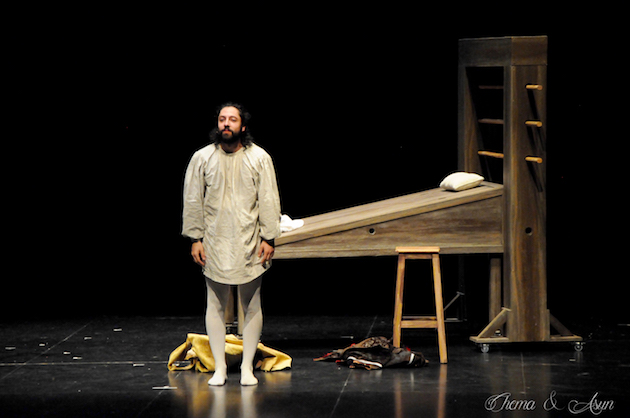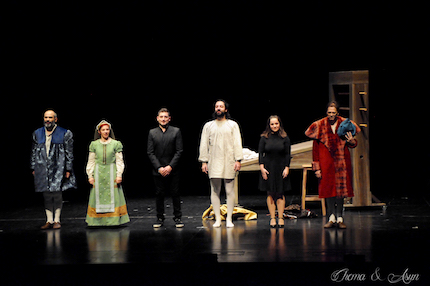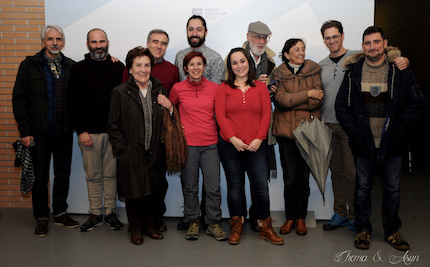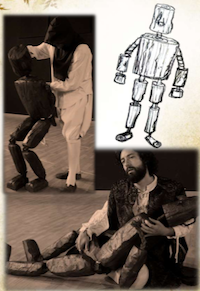The play “Memory of Ashes” recreates episodes of the life of the man who first translated the New Testament into Spanish.
 A scene of the play about Francisco de Enzinas. / Chema&Asun
A scene of the play about Francisco de Enzinas. / Chema&Asun
Almost five centuries after his birth, Francisco de Enzinas has been brought back to the collective memory of the Spanish people in his native city of Burgos.
There have been conferences, exhibitions and an International Congress with the greatest specialists in the study of this remarkable Spanish Protestant of the 16th century.
The President of the Autonomous Region of Castilla y León, Juan Vicente Herrera, opened the events, which have been organised by the Francisco de Enzinas Cultural Association and the Evangelical Council of Castilla y León.
On December 1 and 2, as a grand finale of the Congress, around one thousand people enjoyed the premiere of the play "Memory of ashes".
The play recreates episodes of the life of Francisco de Enzinas, reconstructed from direct sources that he himself left in his memories, as well as other writings of the time that help to understand the the figure of Enzinas, who translated the New Testament into Spanish for the first time.
Its director and scriptwriter, Alejandro Britos, explained in an interview with Spanish online newspaper Protestante Digital the great surprise that it was for him to discover this character.
Britos vindicates his figure as an example of religious tolerance and passion for the word.
 The theatre company Bambalua has recreated episodes of the life of Francisco de Enzinas. / Chema&Asun
The theatre company Bambalua has recreated episodes of the life of Francisco de Enzinas. / Chema&Asun
Question. How did you first learn about Enzinas?
Answer. Miguel Angel Vieira, who is coordinating all the events around the figure of Francisco de Enzinas, approached the company and proposed us to prepare a play.
We did not know tEnzinas, but it took little to fall in love with the character and to see that we could create something of interest for a general audience vindicating his figure. Then the character seduced us and we embarked on the project.
Q. Enzinas has gone largely unnoticed, hasn't he?
A. Yes, he has been ignored precisely because he was a Protestant, for being a friend of Luther, Calvin, and so many reformers of the time. We are talking about the first person to translate the New Testament into Spanish, apart from many other things. But just for that reason he deserves to be known.
Q. How was the process to prepare the play?
A. We have been working for a year and a half; nine months creating the dramaturgy, a series of months doing the preproduction with the scenography and the costumes, among other things. And then, several months of rehearsals.
 The company with Miguel Angel Vieira, who has coordinated all the events around the figure of Francisco de Enzinas. / Chema&Asun
The company with Miguel Angel Vieira, who has coordinated all the events around the figure of Francisco de Enzinas. / Chema&Asun
We insisted on working with Francisco de Enzinas' texts. We took them from his letters, from his memoirs or from the comments or prologues he made in his translations of classic or religious authors.
Approximately 80% of the text is original by Francisco de Enzinas. We have built a puzzle with all that and we have taken it to a theatrical dramaturgy.
Q. How could we define the time in which Enzinas lived?
A. It is a turbulent time, difficult. Enzinas lived in a Europe that was agitated by the political, cultural and religious environment.
He risked his life, his patrimony, for this idea, to facilitate the reading of the Bible to the Spaniards and bring the ideas of the Reformation to them.
Q. After the premiere, what do you expect for this play?
 The company worked for a year and a half to prepare the play. / Bambalua
The company worked for a year and a half to prepare the play. / BambaluaA. At the moment we do not have closed dates, but our idea is to take it to other cities in Spain. We are editing the video of the show to be able to show it to everyone who has is interested in it.
Hopefully, we would be able to present it throughout Spain. Anyone interested can can contact us in our website.
Q. How has Francisco de Enzinas impacted you?
A. It had never happened to me to be on stage with goosebumps. The character has impressed us.
Francisco de Enzinas is an example of commitment, of rebellion, and above all, his life is a song in favor of religious tolerance. He is a person who left everything behind for his ideas, his passion. Without a doubt, he is a great example for our time.

Las opiniones vertidas por nuestros colaboradores se realizan a nivel personal, pudiendo coincidir o no con la postura de la dirección de Protestante Digital.
Si quieres comentar o